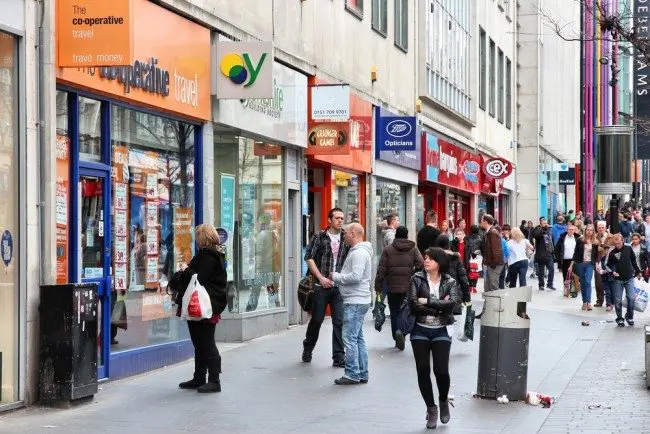High street sales fell sharply this month and at their fastest rate since December 2008, leaving sentiment “crumbling” among retailers.
A survey by the CBI employers’ group found that retail sales volumes and orders deteriorated in August as bricks and mortar shops continue to struggle.
While non-store retailers posted a rise in sales, internet growth was also depressed below its average, suggesting that consumer confidence is weakening rather than just shifting online.
The CBI, which speaks for Britain’s biggest businesses, said that grocery, clothing and DIY retailers suffered a drop in sales.
About 10 per cent of respondents reported that sales volumes were up on a year ago, compared with 58 per cent who said they were down.
Anna Leach, CBI deputy chief economist, said: “Sentiment is crumbling among retailers, and unexpectedly weak sales have led to a large overhang of stocks. With investment intentions for the year ahead and employment down, retailers expect a chilly few months ahead.”
She added: “Retailers are also buckling under the cumulative burden of costs, including an outdated business rates system and the apprenticeship levy. Businesses will be looking for government action at the budget in the coming months to alleviate some of these pressures.”
The survey showed retailers cut orders with suppliers at a near-record pace and built up stocks. Only 2 per cent of the CBI’s respondents expected the business situation to improve during the next three months.
“The very weak August CBI survey raises the possibility that consumers are becoming more concerned and cautious as the UK’s October 31 departure date from the EU looms and expectations of a no-deal Brexit rise,” Howard Archer, chief economic adviser to the EY Item Club, said.
The survey also revealed that retail employment fell for the 11th straight quarter as shop owners struggle to afford rising costs from the living wage and business rates at a time when their shops have become less profitable.
Retail employment is falling rapidly as a number of retailers, including Topshop, New Look and Monsoon, use insolvency procedures to shut stores and cut their rent bills.
The recent sale of Karen Millen to the online retailer Boohoo created 1,100 redundancies as the fast-fashion business said it had no need for stores. Sports Direct, which bought Jack Wills out of administration, has warned landlords it will shut stores if it fails to secure rent reductions.
Even retailers in better financial health are restructuring their workforces to adapt to the consumer shift to online shopping.
The UK’s biggest retailer, Tesco, recently announced it would be cutting another 4,500 jobs as part of a cost-cutting plan. The British Retail Consortium last month revealed that about 72,000 jobs had been lost compared with the same quarter last year.
Uncertainty about a no-deal Brexit has also been blamed for curtailing investment and weighing on consumer confidence. Last week more than 50 retailers including Marks & Spencer, Harrods and Iceland wrote to Sajid Javid, the chancellor, demanding tax cuts and fundamental reform to protect the high street and said that the business rates system was harming investment in the sector.
Behind the story
The latest retail sales data paints a grim picture of spending on the high street but economists have doubts about its reliability (Gurpreet Narwan writes).
Capital Economics said in a research note before the CBI figures came out that it was sceptical that the gloomy message of the survey, and similar data from the British Retail Consortium, would be fully reflected in the official consumer spending data.
Data from the Office for National Statistics covers 93 per cent of the retail industry, while the BRC covers 70 per cent and the CBI less than 50 per cent. The BRC survey is tilted toward big retailers, whereas the official data is thought to be better at capturing internet spending.
“So if the BRC and CBI surveys are placing more emphasis on bricks-and-mortar retailers and less on internet retailers, this could mean the surveys are exaggerating the extent of the weakness in the consumer sector,” Ruth Gregory, senior UK economist at Capital Economics, said in a note.
“The weakness in the retail surveys has led some to question whether the consumer sector will succumb to the malaise that has taken hold in the manufacturing sector. But we are sceptical the consumer sector will falter . . . In all our Brexit scenarios, we think households will remain the strongest part of the economy.”
Economists have also said the qualitative nature of the CBI surveys’ questions — which ask businesses whether their output is higher, the same, or lower than a month ago — undermines its reliability. It could be that a large number of them are reporting a fractional fall in sales growth. “That would lead to a much lower survey balance but could be consistent with a small fall in spending growth,” the note added.
The ONS figures have also been criticised by the retail industry. Nick Bubb, an independent retail analyst, said this month that the “bizarre parallel world” portrayed by what he called “Planet ONS” showed “suspiciously high-looking sales” for small businesses.


